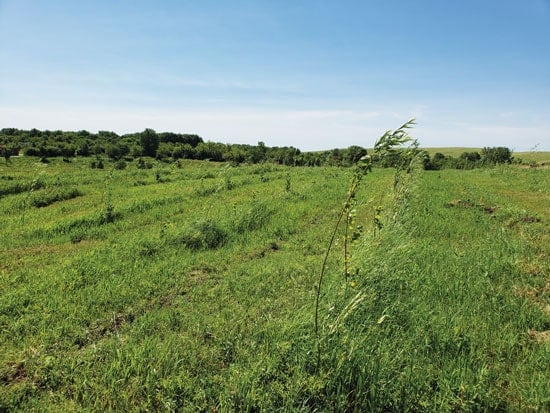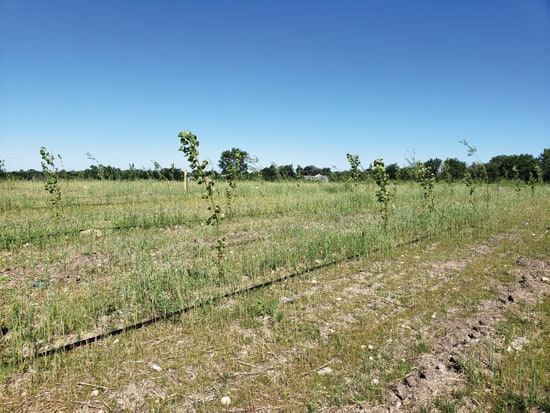The Forest Preserve District of DuPage County, IL took a comprehensive approach to operating a closed landfill, which provided incentive for innovative, sustainable solutions geared toward their mission of preserving and restoring natural spaces. Their solution for leachate management even included planting thousands of trees. The site’s improvements provide a safe and natural neighbor and habitat for wildlife for years to come.
By Eric Wiediger
The landfill must have been a busy place back in the late 1960s and early 1970s. Waste trucks coming and going as employees worked hard to maintain a successful operation. Located in the suburbs of Chicago, the 32-acre facility accepted municipal solid waste and construction and demolition debris until it was closed in 1975. Over the 40 years since closure, the site has been recognized as lacking the sophisticated environmental protection systems incorporated in current landfills. This can be a story about any of the thousands of old landfills and dumps throughout the country, but this one has a twist.
The landfill was purchased by the Forest Preserve District of DuPage County soon after closure and is now a part of an impressive network of 26,000 acres of open space that includes pristine lakes, 145 miles of trails and a variety of recreational areas. As the landfill owner and operator, the Forest Preserve District performed voluntary investigations and remedial clean-up actions in cooperation with federal and state agencies, including the installation of early leachate and gas collection systems.

Facility Improvements
A few years ago, the Forest Preserve District took the initiative to complete a thorough assessment of the landfill’s conditions to ensure the site is fully protective of human health and the environment. They oversaw detailed evaluations of the disposal units, hydrogeology of the area, its leachate and gas collection infrastructure, groundwater monitoring, streambank stabilization, and overall operation and maintenance. Feasibility studies were performed to find the best options for improvements that fit their mission of environmental stewardship.
Their comprehensive strategy allowed for a holistic approach to their objectives and provided incentive for innovative, sustainable solutions. They worked with engineering firms and contractors to lay out an overall plan for schedule and integration. Simultaneous installation of the different projects, such as new leachate and gas recovery wells, piping, electrical work and earthwork, as well as an onsite leachate disposal system using phyto-technologies, provided opportunity for an impressive level of coordination by everyone involved.
“The approach of the Forest Preserve District from the beginning of our involvement was clear, forward thinking in order to find the best long-term solutions for the management and mitigation of future risk for the landfill. The Forest Preserve District provided an environment where we were all able to work together to successfully complete multiple projects at the same time,” said Ric Stoor, the Engineer on record for Leachate Management Specialists.
“Natural” Leachate Management
Despite being closed for decades, the landfill not only continued to produce a significant volume of leachate, it was also calculated that a substantial amount was pooled within the waste mass. Upon completion of a detailed study evaluating numerous leachate management technologies, the Forest Preserve District determined the option best suited to manage leachate disposal, and to reduce the amount of liquid at the base of the landfill, was a combination of continued direct discharge to a wastewater treatment plant and implementation of an innovative and patented tree-based irrigation system on the landfill using Phyto-Utilization™ and ETCap® technologies.
A Phyto-Utilization™ system by Leachate Management Specialists LLC (LMS) processes the leachate in a site-specific pretreatment system, then pumps it to a field of specialized plants that are highly tolerant to harsh conditions. The trees use the components of leachate (moisture and various compounds) as key ingredients for plant growth. The moisture is consumed by the plants to satisfy water demand and the compounds in leachate act as micro and macro nutrients. LMS collaborated with Ecolotree Incorporated to include an ETCap®, which is a hybrid poplar and willow tree cover that is irrigated with leachate from the landfill. The approach is able to capitalize on the natural ability of the plants to dispose leachate on site, thereby turning a waste (leachate) into a resource and lessening the dependence on a wastewater treatment plant for disposal. The phyto system becomes a “Natural” solution to a practical problem.
The Forest Preserve District’s Phyto-Utilization™ system was designed using advanced modeling and engineering to ensure safe operation protective of the environment and in compliance with its state permit. Specifically, leachate generated from the collection system is distributed to trees on nearly 15 acres of the landfill cover through an automated distribution system. The multiple leachate flows are controlled by an integrated supervisory control and data acquisition (SCADA) system with remote access capabilities, rain sensor, and operational notifications. Since operation began in 2018, it has already consumed over 3.3 million gallons of leachate.

Photos courtesy of Leachate Management Specialists.
Looking Forward
In addition to consuming leachate, a Phyto-Utilization™ system using an ETCap® significantly reduces water infiltration into the landfill. Over time, the amount of leachate produced should decline and the reservoir of leachate remaining in the landfill mass will slowly dissipate. The tree-based system also results in the sequestration of tons of carbon dioxide due to plant growth, thereby reducing the carbon footprint of the site. Eventually, an assortment of native trees will be grown in the phyto field to create smart forest management and biodiversity.
“The Forest Preserve District of DuPage County is thrilled to partner with Leachate Management Specialists on such a revolutionary approach to onsite leachate treatment. The Phyto-Utilization system benefits the residents of DuPage County by reducing the long-term costs for leachate disposal while increasing biodiversity within the preserve. Being able to achieve these two goals simultaneously achieves the Forest Preserve District’s mission to be both fiscally and environmentally sustainable within one project,” said Brock Lovelace, Manager of Engineering and Environmental Services for the Forest Preserve District.
Through hard work, dedication, and a strong mission to restore natural spaces, the Forest Preserve District has shown that owning and operating an old landfill can be done in a positive light in the public eye. One of their solutions even included planting thousands of trees to find a better way. The site’s improvements provide a safe and natural neighbor and habitat for wildlife for years to come. | WA
Eric Wiediger is a Senior Project Manager at Leachate Management Specialists, LLC with 13 years of experience in solid waste management in both public and private sectors, including design, permitting, and operation of natural systems for leachate management, and regulatory oversight of enforcement cases involving municipal, industrial, and hazardous wastes. He also served as a Peace Corps environment volunteer in Mongolia. Eric can be reached at [email protected], or visit www.leachate.us.
